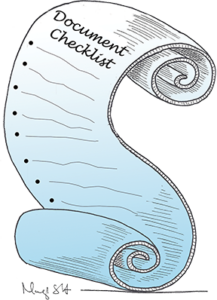
Important Legal and Financial Documents
 Several documents are necessary to have in place for managing finances and making sure that all of the legal documents are in place. Here is a checklist:
Several documents are necessary to have in place for managing finances and making sure that all of the legal documents are in place. Here is a checklist:
- Caregiver Agreement
A Caregiver Agreement is a formal contract that states what care is to be provided and how much the caregiver will be compensated. This is a useful contract for a family or non-family caregiver. The agreement should include the date care begins, detailed description of services, schedule of services, how long the agreement is in effect, location where services will be provided, a statement that the terms of the agreement can be modified by mutual agreement (in writing) of the parties involved, and signatures by the parties and date agreement was signed.
- Durable Power of Attorney
A Durable Power of Attorney is a legal document in which you appoint another person to act on your behalf. This keeps your finances in the hands of a person you trust. If you become incapacitated, that person (the agent) has the authority to make financial decisions for you (the principal). The Durable Power of Attorney is effective until you die or until you decide to revoke it.
- Health Care Power of Attorney and Health Care Proxy
A Health Care Power of Attorney—or Durable Medical Power of Attorney—is a legal document used to appoint a person to make decisions for you. If you are unable to make those decisions for yourself, a health care proxy can make sure that health care providers follow your wishes and can decide how your wishes apply as your medical condition changes. Hospitals, doctors and other health care providers must follow this person’s decisions as if they were your own. You may give this person as little or as much authority as you want, i.e., you may allow your proxy to make all your health care decisions or only certain ones.
- Living Trust
Living Trust (different from a Living Will) is a legal document that allows you, or a person you name as trustee, to transfer ownership or title of your assets into a trust, but you still keep control of those assets throughout your lifetime. It names those who are to receive the assets from your trust when you die. A living trust allows your heirs to avoid probate, the court process by which a will is determined to be valid or invalid.
- Last Will and Testament
Last Will and Testament is a legal document that gives directions about where and to whom your assets should go after you die. You name an “executor” to carry out your directions as stated in the will; choose someone you have complete confidence in who is well organized and who knows you, but does not have a conflict of interest.
- Living Will
A Living Will serves as a written declaration of your health care wishes when you cannot communicate them personally. It explains your health care preferences and instructs your doctor about your end-of-life decisions. You may say something as simple as, “I prefer that all care be directed at comfort and that life supportive treatments not be used.” Or, you may want to be more precise and describe the medical situations in which you would accept or refuse medical treatment. (NOTE: A Living Will is not used to name a proxy. You must name your proxy in a separate Health Care Proxy document.)
It is advisable to have both a Health Care Proxy and Living Will. The person with your Health Care Proxy or Power of Attorney is designated to make decisions, based on your instructions, if and when you are unable to speak for yourself. A Living Will specifically outlines your decisions about health care treatment, but it does not provide a spokesperson. Together, the two documents can work to make your health care wishes clear and guarantee those wishes are carried out.
The person designated as your Health Care Proxy or Power of Attorney can act as your agent, making them a fiduciary. To learn more about the role and responsibilities of a fiduciary, vision the Consumer Financial Protection Bureau to view their guides on managing someone else’s money. These guides provide information on navigating fiduciary roles such as power of attorney, trustee, and more.
Other Important Documents
You should also keep a record of where the following documents are located, and keep them organized:
❏ Medical records
❏ Birth Certificate
❏ Social Security benefit/payment information
❏ Medicare and Medigap policy information
❏ Insurance policies (health, life, home, auto, etc.)
❏ Pension, 401(k) and other income related benefit statements
❏ Bank statements
❏ Loan agreements
❏ Investment statements (IRAs, mutual funds, etc.)
❏ Stock and bond certificates and statements
❏ Mortgage papers
❏ Deeds
❏ Tax Records
❏ Tax receipts and relevant documents needed for tax filing
❏ State and Federal income tax returns
❏ Vehicle titles
AARP has developed a useful document that can be used to list records, their locations, and contact information for professionals such as accountants, clergy, etc.
